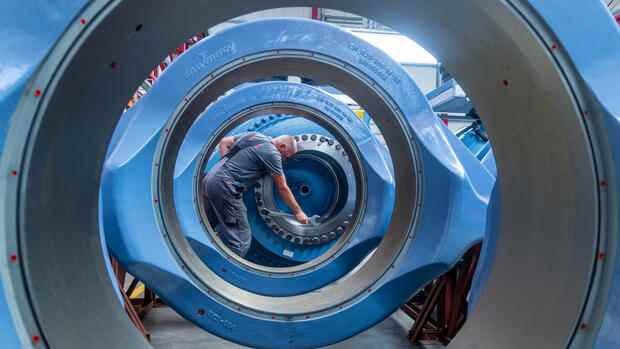In the manufacturing sector, the electrical and automotive industries in particular are currently looking for new employees.
(Photo: dpa)
Berlin The job market is feeling the growing economic pessimism. The willingness of companies to hire has fallen to its lowest level since May 2021, according to the Ifo employment barometer. “Overall, companies are still planning to hire new staff, but have become more cautious when it comes to personnel planning due to the current high level of uncertainty,” says Klaus Wohlrabe, who heads the surveys at the Munich Ifo Institute.
Ifo President Clemens Fuest explained on Monday at the presentation of the Ifo business climate that it had fallen to its lowest level in around two years: “Germany is on the brink of recession. “
The economy is therefore more reluctant to take on new staff than in the previous months. The Ifo employment barometer, which is based on the personnel plans of around 9,000 companies and is calculated monthly exclusively for the Handelsblatt, fell to 101.1 points in July, after 103.3 points in the previous month.
Even if the sub-indicator for the manufacturing sector has also fallen slightly, industry is still proving to be a job engine. According to Wohlrabe, there is still a great need for hiring, especially in the automotive and electronics industries.
Top jobs of the day
Find the best jobs now and
be notified by email.
>> Read here: Employee shares and top salaries: who Siemens is currently looking for – and what the group has to offer
According to data from the employers’ association Gesamtmetall, employment in the electronics industry in April was 3.2 percent higher than a year ago, while the level in the automotive sector was two percent below the previous year’s level.
At the beginning of June, the hotel and restaurant industry had called for facilitation of the immigration of workers – analogous to those for service staff at airports. More than 60 percent of the companies are looking for specialists and unskilled workers, said the President of the Dehoga industry association, Guido Zöllick, citing a company survey from June.
But in the meantime, the hospitality industry has also “slammed on the brakes” when it comes to new hires, as Ifo expert Wohlrabe puts it. This has contributed to the fact that the sub-indicator of the employment barometer for the service sector fell sharply – from 18.5 points in the previous month to 12.4 points in July. It was last listed lower at the beginning of the year.
Retail and construction companies are more cautious in their personnel planning. There is hardly any need for new hires here. In addition to inflation, which drives up the prices for energy and building materials, the construction industry is also affected by rising building interest rates. The industry’s orders fell by 7.5 percent in May compared to the previous year, for the months of January to May the bottom line is a real minus of 1.7 percent.
“Companies still have a lot to do at the moment,” commented Felix Pakleppa, General Manager of the German Construction Industry Association (ZDB), on the latest order data. “But no one can say how long this trend will last.”
More: Ifo: Gas shortage burdens export industry in Germany

